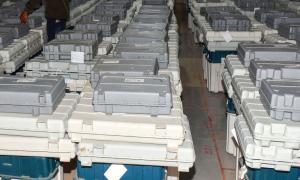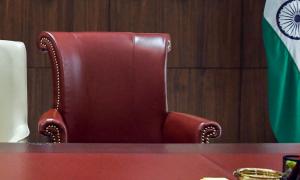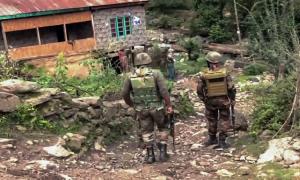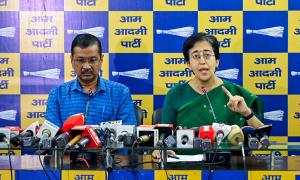A confidante of Indira Gandhi and her son Sanjay during the controversial Emergency days in 1975, Bansi Lal, who died in New Delhi late Tuesday night, had carved a niche as much for his contribution to building a modern Haryana as for his political acumen.
Born on August 26, 1927, Lal was elected to the state assembly seven times, the first time being in 1967. After Haryana was formed in 1966, much of the state's industrial and agricultural development, especially creation of infrastructure, took place due to Lal's initiatives.
He was responsible for electrifying all villages during his tenure as chief minister in the late sixties and seventies. Lal was also the pioneer of highway tourism in the state - a model later adopted by a number of states.
Lal became the third chief minister of Haryana after Bhagwat Dayal Sharma and Rao Birender Singh. After he parted company with Congress in 1996, Lal set up Haryana Vikas Party and his campaign against prohibition propelled him to power in the assembly polls the same year.
One of the first orders passed by him on assuming the top post was introducing prohibition in the state. Ironically, he paid the price for prohibition as Haryana Vikas Party could win just two seats in 2000 assembly elections.
Justice J C Verma Commission, appointed by Chautala regime to probe prohibition, had indicted Bansi Lal for creating a situation for smuggling of liquor during the 19-month prohibition period in the state between 1996 and 1998.
Lal was in the limelight when Emergency was imposed by the then Prime Minister Indira Gandhi in 1975. He along with Sanjay Gandhi was said to be responsible for various steps during the Emergency, including a plan to cut off power supply to newspaper establishments and close down courts.
He became the Chief Minister four times in 1968, 1972, 1986 and 1996. Lal did not contest the assembly elections in 2005 but his sons Surendra Singh and Ranbir Singh Mahendra were elected to the state assembly. Surendra Singh died in a helicopter crash near Saharanpur in Uttar Pradesh last year.
Born in Golagarh village in Bhiwani district of Haryana, Lal studied at the Punjab University Law College, Jalandhar. In 1972, he was awarded honorary degrees of Doctor of Law and Doctor of Science by the Kurukshetra University and the Haryana Agriculture University respectively.
A vegetarian, Lal was elected to the state assembly for seven times in 1967, 1968, 1972, 1986, 1991 and 2000. He was the defence minister from December 21, 1975 to March 24, 1977 and a minister without portfolio in the Union government from December 1, 1975 to December 20, 1975. Lal became railways minister on December 31, 1984 and later minister for transport.
He became Haryana chief minister for the first time on May 31, 1968 and remained in office till March 13, 1972. On March 14, 1972, he occupied the top post in the state for the second time and was in office till November 30, 1975. The third and fourth times he was appointed chief minister was from June 5, 1986 to June 19, 1987 and May 11, 1996 to July 23, 1999.
Lal was president of the Bar Association, Bhiwani from 1957 to 1958. He was president of District Congress Committee, Hissar, from 1959 to 1962 and later became member of Congress Working Committee and Congress Parliamentary Board.
As a freedom fighter, Lal was secretary of Parja mandal in the Loharu State, from 1943 to 1944. He was also the chairman of the Committee of Parliament and Committee on Public Undertakings, 1980-82, and the Committee on Estimates, 1982-84.
Lal was a member of Punjab Pradesh Congress Committee between 1958 and 1962. He was a Rajya Sabha member from 1960 to 1966 and 1976 to 1980. He was a Lok Sabha member -- 1980 to 1984, 1985 to 1986 and 1989 to 1991.
A widely travelled person, Lal visited a number of countries, including Burma, Afghanistan, erstwhile USSR, Mauritius, Tanzania, Zambia, Seychelles, United Kingdom, Kuwait, Greece, West Germany, The Netherland, Belgium, France and Italy.








More from rediff